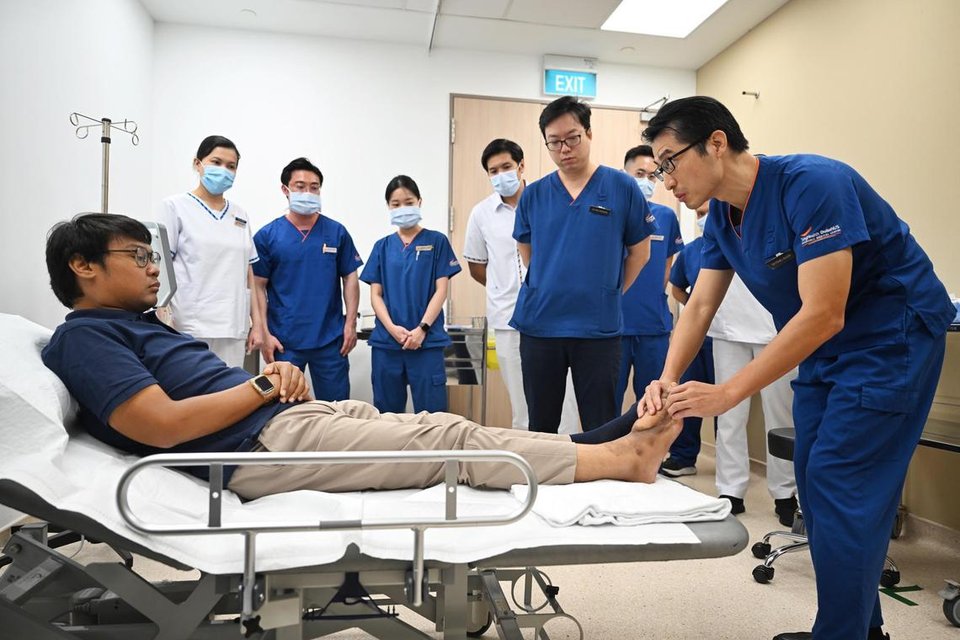New rehabilitation centre brings robotics therapy to the elderly in Bukit Batok community

Published on
06 Jul 2024
Published by
The Straits Times
SINGAPORE – A new robotics rehabilitation centre has just been opened in Bukit Batok, bringing advanced robotics therapy closer to elderly residents.
St Luke’s ElderCare Day Rehabilitation Centre @ Bukit Batok Central, which opened on July 5 at Block 229 Bukit Batok East Avenue 3, will enable residents to get the help they need in the community instead of having to travel to hospitals.
The centre was officially opened by Minister of State for Law and Transport and Bukit Batok MP Murali Pillai. It will be operational from July 9.
Advanced robotics therapy enhances physical rehabilitation for patients recovering from injuries, illnesses or surgery by employing a range of robotic devices to train lost body functions.
Access to advanced robotics in rehabilitation is currently available in hospitals such as Tan Tock Seng Hospital, Changi General Hospital and Sengkang General Hospital, as well as institutions such as non-profit organisation Stroke Support Station (S3).
Dr Kenny Tan, chief executive officer of healthcare provider St Luke’s ElderCare, said its goal is to support ageing in communities by leveraging advanced technology and robotics, alongside personalised rehabilitation plans developed by its therapists.
“We want to ensure as many elders as possible can access the care they need conveniently and comfortably, close to home,” said Dr Tan, who is also an adjunct associate professor of the health and social sciences cluster at the Singapore Institute of Technology.
Conventional physiotherapy focuses on helping patients regain movement, strength and flexibility after injuries, illnesses or surgery, and can be challenging for both patients and physiotherapists.
Prolonged rehabilitation periods may cause patients to get frustrated, on top of facing discomfort during recovery. Doing repetitive exercises can also become boring for patients, leading to decreased motivation.
Physiotherapists, on their part, often have to carry out physically demanding tasks, such as assisting patients with exercises or helping them to move around.
Mr Caleb Low, acting head of physiotherapy at St Luke’s ElderCare, said the advanced robotics equipment helps therapists enhance the execution of certain aspects of physiotherapy treatment that are very labour-intensive, such as mobility training.
“For example, during the early stages of rehab for a stroke client where we carry out mobility training, which requires two people to assist the patient, it can be physically strenuous for us,” he said.
“So when we put such clients on a machine, it not only makes the whole process safer but also improves the consistency and the quality of the intervention provided.”
By introducing game elements such as points and difficulty levels to the process of physiotherapy, the robotics equipment also makes therapy more effective, assisting patients in making precise movements with good control and motivating them to participate actively.
Mr Low said: “One very big benefit is the element of fun and engagement that is injected into what would otherwise be very repetitive and mundane tasks. At the end of the day, task-specific repetition is actually key to the effectiveness of stroke rehabilitation. So it’s really good to be able to engage them while they execute those repetitions.”
One such piece of advanced robotics equipment used in the new Bukit Batok rehabilitation centre is the Armeo Spring Pro machine.
The smart robotic device provides constant arm weight support, while the patient moves his or her arm to the left or right to burst balloons in a game that strengthens the patient’s arm.
There are seven pieces of advanced robotics equipment in the centre that assist the elderly with improving mobility in different parts of their body, especially upper and lower limbs.
Madam Lee Seng, a resident who lives near the centre, had to use a wheelchair for about two months due to back pain, before undergoing surgery about two to three years ago.
Post-surgery, she suffered from body stiffness and found it difficult to move her hands and legs.
The 86-year-old underwent physiotherapy in a community hospital and her treatment included advanced robotics therapy, which she found effective. Subsequently, she could move around without a wheelchair.
St Luke’s ElderCare has invested more than $1.5 million to bring advanced robotics equipment to the community through three of its day rehabilitation centres.
While the new Bukit Batok centre will cater to the western region of Singapore, the Salem Centre in Yishun, which became operational in July 2023, will cater to the central region.
The Active Ageing Centre (Care) @ Northshore, Punggol, which started operations in September 2023, will serve the eastern region.
St Luke’s ElderCare has established partnerships with community care providers such as St Luke’s Hospital and Fei Yue Community Services, which are in the vicinity of the new Bukit Batok centre.
The partnerships allow the Christian healthcare provider to provide the elderly with a complete spectrum of care, from active ageing to senior care centres and nursing home services.
Looking ahead, St Luke’s ElderCare plans to further cater to the western region of Singapore with the upcoming St Luke’s ElderCare Residence @ Jelapang, a new nursing home slated to open in 2026.
Clarification note: This article has been updated to add that access to advanced robotics in rehabilitation is also available in the non-profit organisation Stroke Support Station (S3).
Source: The Straits Times © SPH Media Limited. Reproduced with permission.
ALL views, content, information and/or materials expressed / presented by any third party apart from Council For Third Age, belong strictly to such third party. Any such third party views, content, information and/or materials provided herein are for convenience and/or general information purposes only. Council For Third Age shall not be responsible nor liable for any injury, loss or damage whatsoever arising directly or indirectly howsoever in connection with or as a result of any person accessing or acting on any such views, content, information and/or materials. Such third party views, content, information and/or materials do not imply and shall not be construed as a representation, warranty, endorsement and/or verification by Council For Third Age in respect of such views, content, information and/or materials.







